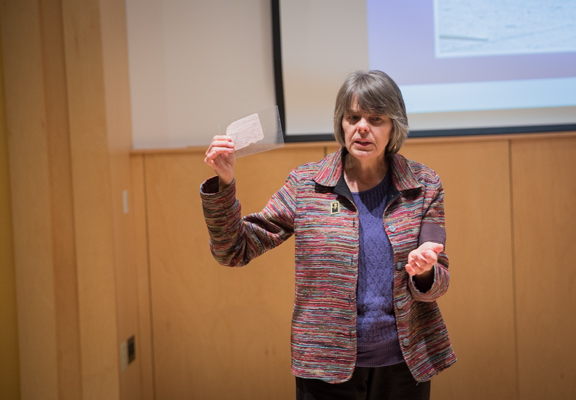The 13-year-old student in Des Moines, Iowa, who stood up for her rights by wearing a black armband to school is now traveling across the country encouraging students to stand up for what they believe in.
Mary Beth Tinker shared her story — which shaped a landmark court decision concerning students’ First Amendment rights in school — with Lipscomb students Oct. 15 in Ward Hall. She uses the Tinker v. Des Moines court case to fuel conversation with other young people when she visits different schools.
“There is a great power in young people and there is a great power in the values of our faiths,” Tinker said. “When you put those two together — young people and those spiritual values — that’s a very powerful combination.”
This powerful combination that she shares with students today is what led her to stand up for all the lives taken in the Vietnam War 50 years ago.
As an eighth-grade student in 1965, Tinker was strongly affected by the news of Vietnam, as graphic footage was brought straight to the living rooms of many people.
To mourn the dead on both sides of the war, she wore a black armband to school, along with her brothers, sisters and several other classmates. The armbands also supported a Christmas truce called for by Sen. Robert F. Kennedy.
Just before the students wore their armbands to school, the principal put a rule in place banning students to wear the armbands. Most of the students who wore the armbands were suspended, including Tinker.
“When we wore the black armbands to school on Dec. 16 and 17, 1965, we thought it was going to be over on Dec. 18,” Tinker said. “We had no idea it was going to be this big deal. The ironic thing is it probably wouldn’t have been a big deal except for the principal making a rule against armbands.
“They didn’t have a problem with expression by students — they just wanted the expression to be something they agreed with,” Tinker said.
Tinker and her mother went to several school board meetings and the case was eventually taken to the Supreme Court. The court ruled in a landmark decision in 1969 that students in public schools do have First Amendment rights.
“I went on with my normal life, studying for social studies, studying math, going to slumber parties, going to piano lessons,” Tinker said.
The full weight of the issue didn’t sink in until many years later.
While studying to be a nurse she discovered the Tinker v. Des Moines case in her nursing textbook.
“That was a real wake-up because I realized that actually nurses do learn about this — I learned that our case is part of a bigger issue of children’s rights.”
Now the case is what’s driving her to educate young people about their rights through speaking at several schools.
“When cultures are deprived of the voices and ideas of young people, it’s terrible,” Tinker said. “It’s very detrimental to the culture overall, and so then I started speaking more and encouraging young people to stand up, speak up and use their First Amendment rights.”
Tinker said she meets students who are standing up for what they believe in every day.
She shared a recent story of a group of middle school students in Idaho who noticed that some students had no one to sit with during lunch time. That group started a program that allowed everyone to eat lunch with another person and included lunch-time games and activities for every student to be involved.
“It was such a small, simple thing that the students did,” Tinker said. “You just never know where you’re going to run into positive messages or inspiration, but you can find it just about anywhere.”
While some issues are more complex, Tinker said that all the issues boil down to a simple message of love and understanding.
“The world needs all of us now more than ever,” she said. “We have enough hate, enough haters — we don’t need any more of that. We need more love and understanding, and that’s between all views, all religions, all faiths.
“You use what you have and do something to make the the world better.”
Photo by author

